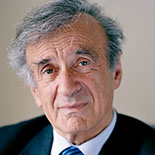 Eliezer “Elie” Wiesel (September 30, 1928 – July 2, 2016) was a Romanian-born Jewish writer, professor, political activist, and Nobel Laureate.
Eliezer “Elie” Wiesel (September 30, 1928 – July 2, 2016) was a Romanian-born Jewish writer, professor, political activist, and Nobel Laureate.
Wiesel is the author of 57 books, including Night, a work based on his experiences as a prisoner in the Auschwitz, Buna, and Buchenwald concentration camps. Wiesel is also the Advisory Board chairman of the newspaper Algemeiner Journal.
When Wiesel was awarded the Nobel Peace Prize in 1986, the Norwegian Nobel Committee called him a “messenger to mankind,” stating that through his struggle to come to terms with “his own personal experience of total humiliation and of the utter contempt for humanity shown in Hitler’s death camps”, as well as his “practical work in the cause of peace”, Wiesel had delivered a powerful message “of peace, atonement and human dignity” to humanity.
From THE TALE OF A NIGGUN
Elie Wiesel
Taking one step forward,
showing no fear,
his entire being reflecting
dignity,
the oldest of the old Jews
declares firmly:
None of us
deserves
more than the other
either to live
or to die.
He waits a moment,
a long moment,
as though he wanted
to add
an explanation,
but changes his mind;
he takes one step backward
and is already
surrounded
by friends and allies.
Is the enemy disappointed?
Impossible to tell.
He moves his sleepy gaze
over the inhabitants
of the ghetto: young and old,
learned and not,
men and women,
children and their teachers,
all are here.
Is the enemy satisfied
that no one is missing?
Impossible to tell.
He looks at his victims
and says
simply,
coldly:
In one hour,
exactly one hour,
you will all be
dead.
And all the Jews,
in a single movement,
turn toward their rabbi
as though to ask for confirmation:
Is it true?
Is it a dream perhaps?
A nightmare? A farce?
Some cry,
others smile,
staring into emptiness.
Let us be ready,
says the rabbi.
He does not say
ready for what;
everybody knows.
Let us recite the Vidui,
all together,
says the rabbi,
and then
Sh’ma Yisrael,
all together;
let the Almighty hear our appeal,
perhaps He doesn’t know
what is happening here below.
Therefore,
my friends,
my brothers,
we shall sing
loudly,
louder and louder,
do you hear me?
We shall sing so loud
that our song will fill
heaven and earth . . .
Some look at him
but do not understand;
others understand
but do not dare
to look at him;
there are those who wonder:
Sing?
You want us to sing,
rabbi?
Here? Now?
Yes! Now!
commands the rabbi.
I want you to sing now!
I am going to teach you
a song . . .